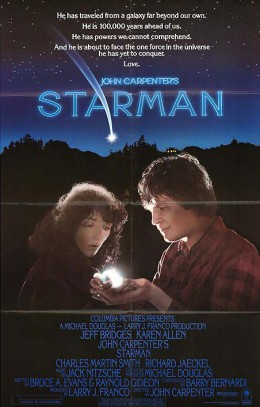Haaaay, party people! Welcome back to the Movie Rewatch of Great Nostalgia!
Today’s entry looks back on that iconic alien luurrve story, 1984’s Starman. Yellow light means go very fast!
Please note that as with all films covered on the Nostalgia Rewatch, this post will be rife with spoilers for the film.
And now, the post!
ME: So what do y’all remember most about Starman?
LIZ: What do you remember most about it?
ME: Uh… you first.
KATE: I mostly remember that it was sad.
LIZ: I remember the deer!
ME: …there was a deer?
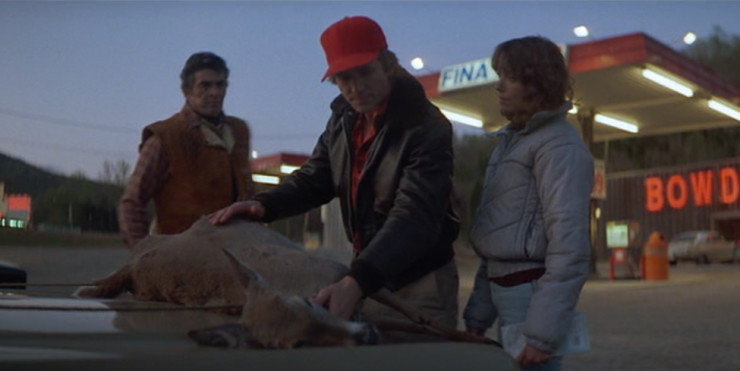
Right, so it turns out that I remembered basically nothing about Starman. I remembered so little about it, in fact, that I started to doubt that I’d ever seen it at all, but Liz and Kate both think it was more or less impossible that I wouldn’t have seen it if they saw it. And I do think it feels familiar, in a vague way, but I certainly didn’t recall most or all of the specifics.
So watching Starman for the MRGN was functionally the same as seeing it for the first time. For all of us, really: even though my sisters both remember seeing it much more clearly than me, their memories of the movie were nevertheless surprisingly limited. Liz and I have theories on why this is, which we’ll get to in a moment.
But first, the movie itself, which I was very surprised to realize was directed by John Carpenter, for pretty much the exact reason (according to the Internet) Carpenter wanted to do the movie in the first place: to keep from being pigeonholed as a director of horror flicks. Although going by my example, at least, he kind of… failed to do that, it seems. Sorry, Mr. Carpenter.
But at least he produced, in my opinion, a really good movie in the attempt!
Genre mash-up movies, in my experience, generally tend to be either brilliant or awful, with no in-between. And despite the way my hackles instinctively rise when I hear the phrase “science fiction romance film”, this one turned out to be one of the brilliant ones, fortunately. Which is impressive, because that particular genre combination can be especially hazardous, given the science fiction genre’s tendency to favor plot over character, and the romance genre’s penchant for doing the exact opposite. Thus it is very often the case that never the twain shall meet, and you get something that’s either ridiculous, unbearably sappy, or both.
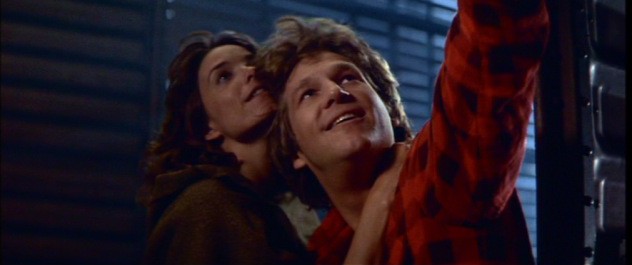
Carpenter, however, instead of trying to have his cake and eat it too, obviously chose what I imagine felt like a sacrifice play (even if it shouldn’t be seen as one), and guided the film to emphasize the romance characterization over the sci-fi plot. And while that meant a whole barrel full of implications, both political and narrative, got skimmed over or ignored entirely, it also meant that the movie as a whole was much more emotionally engaging and satisfying. Because we genuinely cared about Jenny Hayden and Jeff Bridges’ nameless alien, and what would happen to their relationship.
Hell, we even cared about what would happen to SETI scientist and unwilling NSA stooge Mark Shermin:
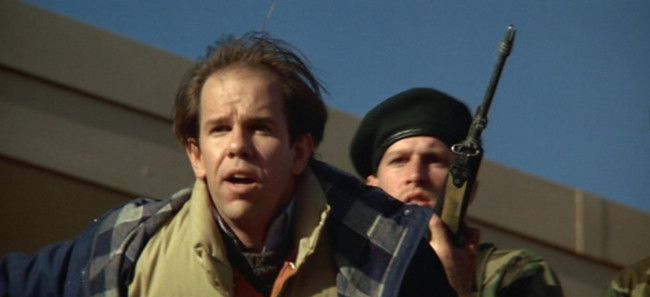
One of the best moments in the movie, in fact, is when Shermin gets to tell his asshole government overlord to blow it out his ass, symbolically if not verbally:
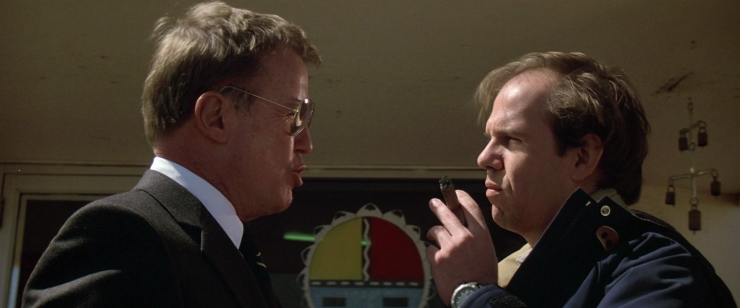
I don’t know about anyone else, but I totally cheered for him.
(Speaking of which, if you’re wondering how to know if you’re watching a movie made before circa 1989, here it is: everybody smokes. Not just bad guys, but main characters, minor characters, and random extras too. I’d already noticed this with Ghostbusters, but Starman was even worse about it; at least two gags in the film revolved around smoking (the one mentioned above, and one also involving actual gagging, heh). Karen Allen’s character Jenny Hayden is shown smoking as well, a thing almost unthinkable for a leading protagonist role today (although admittedly Jenny seems to forget all about smoking once she’s distracted by all the kidnapping and aliens and such). As a former smoker, I find this probably way more distracting than a non-smoker would. It’s a thing I’d honestly not considered would be a consequence of this nostalgia series, that I would have to watch people egregiously smoking all the time. But don’t worry, I’m staying strong!)
Woo, tangent. Anyway, my point is, Carpenter did an excellent job blending the two genres, and choosing to emphasize the humanity (so to speak) of the characters over the no doubt much more plotty plot that could have been generated here was, in my opinion, absolutely the right move.
Although evidently Carpenter couldn’t resist shoehorning at least a little of the horror genre in there as well, because, um, this:
OMG CREEPY FAKE BABY IS SO CREEPY
Liz was incredulous that she had apparently managed to completely forget about the creepy fake baby, but on reflection thought it was likely that our mom had covered her eyes for this part. I, on the other hand, think it’s also possible that whatever version of the movie we saw might have actually edited this part out. TV back in the day was a lot more invested in protecting our delicate sensibilities back then, after all, to often-annoying-but-sometimes-hilarious effect. (We had such fun reenacting the badly-overdubbed curse words in the TV version of The Breakfast Club, for instance, that it was almost better than getting to hear Judd Nelson say “fuck”.)
I wish I did remember seeing this sequence before though, simply so that I could judge my reaction to it then versus now. Not on whether I thought it was creepy (because I’m pretty sure it is empirically creepy), but on whether I thought it looked as fake then as I think it does now. I’ve gotten dinged a couple of times now in the MRGN’s comments for calling special effects bad or cheesy even when they were cutting-edge at the time, and even though I maintain that up until a very recent point the general badness of special effects was a feature rather than a bug, since I can’t say for sure on this particular film (owing to not really remembering watching it back in the day), I will not call it out.
In any case, Starman mostly does a very good job of working within its limitations and keeping the effects shots to a bare minimum anyway, which definitely works to the film’s benefit. And contrariwise, Starman’s mothership still looks awesome even today, in my opinion:
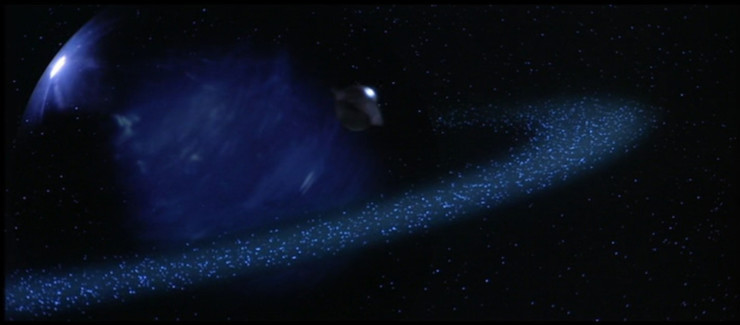
Even if we were sort of confused about what it actually was at first.
LIZ: Wait, is that a planet? What planet is that?
KATE: Uranus.
Plus, Jeff Bridges was more or less a special effect unto himself:
Liz and I agreed that we were a little startled at how Bridges chose to play the character, but there’s no doubt that his mechanical, manifestly unnatural movements and mannerisms were both unnerving at first and later greatly amusing, just as they were intended to be. His Oscar nomination for Best Actor (making Starman the only John Carpenter film nominated for an Academy Award) was well deserved, in my opinion.
Although if you ask me, Karen Allen’s portrayal of a grieving widow thrown headfirst into what has to be the most traumatic mindfuck of a situation possible was just as impressive. Her evolution from abject fear to defiance to sympathy to love for her alien companion was deftly done, and she got far too little credit for it, if you ask me.
Of course, I can’t really bring up Jenny Hayden’s emotional journey in this movie without also acknowledging the rather large consent issues involved.
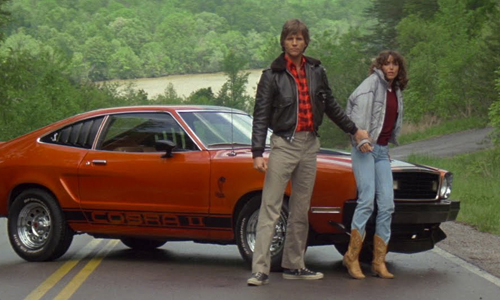
Phrases like “Stockholm Syndrome” float through my head, along with… er, whatever you would call “falling for the alien clone of my dead husband after he forced me to drive him across the country at gunpoint”. (Somehow I doubt I’d find that one in the DSM-V.)
To be clear, I don’t think the movie failed at giving Jenny agency, or that it egregiously victimized her, because if it had done either of those things I would not have liked it at all. But it skirted dannnngerously close to those things more than a couple of times, enough that I was made very uneasy at several points. Most particularly this scene:
Basically, if this had not had the line where Starman offers to stop the pregnancy if Jenny doesn’t want it, I possibly would have walked away from the movie altogether, because WOW. But, fortunately, he does give her a choice in the matter, and so I was able to be happy about it, even if it really would have been much nicer if he’d talked to her about it before impregnating her with his alien/human hybrid baby, aaand yeah I need to stop thinking about this before I talk myself around to being horrified by it again.
All that said, post-coital Starman was frickin’ hilarious, and we also got a good chuckle out of the fact that they literally had a roll in the hay. Ba-dum-dum.
But this brings us to why Liz and I think we all collectively remember so little about this movie, which was that as children, the vast majority of its most resonant themes simply went over our heads. Starman was ostensibly about common sci-fi-themes, like first contact, and the dual angel/asshole nature of humanity which causes us to do things like extend a gold-plated invitation to aliens to come visit us and then shoot them out of the sky when they respond, but its most viscerally affecting themes concern things which are entirely mundane and human, and also unmistakably adult in nature.
As children, my sisters and I were fortunate enough to just have no context for things like the kind of crippling grief that can result from the untimely death of a loved one, or the trauma of wanting a child and yet being unable to conceive one. Nor did we yet have any real interest in or concept of the idea of either romantic love or sexual intimacy, except in the broadest and vaguest of terms. Which meant that every area in which Starman had the most emotional punch were areas in which we were 99% completely oblivious.
So all things considered, it’s probably not all that surprising that we didn’t retain that much about the movie. Which makes me doubly glad for this project, which allowed me to appreciate it far more as an adult as I ever could have possibly done as a child.
So, in sum, I would say that Starman holds up jes fine as a film, and is well worth a rewatch, especially if you haven’t seen it as an adult. And as always, we will end with my Nostalgia Love to Reality Love 1-10 Scale of Awesomeness!
Nostalgia: 1
Reality: 8
And that’s the MRGN for now, kids! Share with me your thoughts! And then come back in two weeks, when we will be taking a turn on the horror side with a Kingian classic: 1976’s Carrie. THEY’RE ALL GONNA LAUGH AT YOU.
Sweet. See y’all there!










